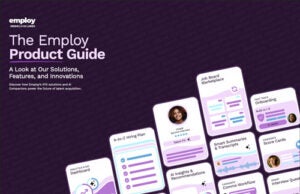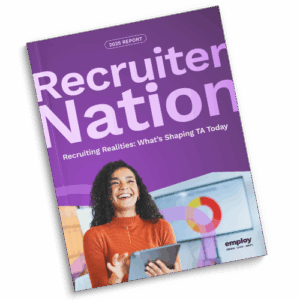Many in healthcare can’t hire fast enough in the new world, post-pandemic. The need for speed and resilience counts in times like this more than ever.
And, the process for hiring in healthcare wasn’t built to handle present-day challenges. Whether hiring now, or after the crisis has calmed, the process healthcare recruiters use to identify and build their talent teams may be changed forever.
The current situation for many doctors, nurses and other healthcare professionals is unprecedented, requiring protocols and acts of heroism under extremely stressful, fast-moving situations.
“Even the most vocal critic of the American healthcare system cannot watch coverage of the current COVID-19 crisis without appreciating the heroism of each caregiver and patient fighting its most-severe consequences,” said Robert S. Huckman wrote for Harvard Business Review.
We spoke to Rosa Elizabeth Vargas, Executive Career Coach at Career Steering, who shared four top questions to ask when interviewing healthcare workers, ensuring they not only are technically qualified, but also have the soft skills and other talents necessary to navigate the labyrinth of uncertainty they often face.
Assessing for resilience
Question #1: The healthcare landscape is changing due to COVID-19. What is one change that has impacted how you work?
“This question helps gauge how the candidate adapts during times of change,” says Vargas.
Crises spur agility and change, even for the most habitual and process-oriented workers.
A candidate’s story of change amid the pandemic should exude particular skills they used to pivot to a new protocol, respond to an unprecedented surge in demand, etc.
Woven throughout the story should be the candidate’s lessons learned and takeaways they plan to use in their new role, if hired.
Dealing with communication barriers
Question #2: How has your patient rapport-building adapted during the COVID-19 crisis, especially in light of the difficulty in sustaining family dynamics?
“Good rapport creates a close and harmonious relationship with patients. It allows you to understand your patient’s feelings and communicate well with them,” according to Melissa Mills, a registered nurse, in How to Build Rapport With Patients. 7 Effective Tips for RNs.
“The importance of rapport can’t be stressed enough in nursing. It connects you to your patients and can improve patient care,” Mills continues.
Navigating unfamiliar barriers in communication is particularly necessary to maintain continuity of care amid the pandemic, emphasizes Vargas, who continues:
“Especially now, due to social isolation, many families are concerned about the care their loved ones are receiving without them there to advocate for them. A healthcare professional is a bridge between the patient and the family members now more than ever before.”
A strong candidate will explain specific, effective and compassionate ways they overcame the communication barriers. This includes describing how they regularly shared medical updates with family members.
It may also include stories of how simple bridge calls deepened the relationship. In one example, a nurse placed her phone in a protective plastic bag to coordinate a group call with the patient’s immediate family who then sang a song of comfort to the patient.
Ramping up quickly with new technology
Question #3: Have you had to utilize technology that you have never used before during this healthcare crisis? What challenges did it present for you?
“The job seeker should feel comfortable with new technology or at least embrace the changes on the rise,” asserts Vargas. “This question would open up a dialogue around their ability to learn new systems quickly.”
Managing risk
Question #4 How do you balance the increased risk to yourself with the urgent need of your patients?
The American Nurses Association’s Code of Ethics for Nurses with Interpretive Statements states that the nurse’s primary commitment is to the patient; it also states that “the nurse owes the same duty to self as others.”
The novel coronavirus has compelled healthcare professionals into situations heretofore not encountered, where the unusually large number of concurrent patients with an infectious disease in one facility has presented new challenges to healthcare professional safety.
In response to this question, a healthcare worker should be able to explain their ability to assess and respond to the risk accompanying each situation as it occurs, including the protocols and reasoning that fueled their responses.
Serving others better
Olympic Gold Medalist and Performance Coach, Joe Jacobi, whose work includes coaching medical doctors, inspired a fifth interview question.
Question #5: How do you take care of yourself? In other words, how are you ensuring you are rested, healthy and high-performing?
Jacobi has found that the people most on the front lines taking care of others are the same people seeking out his guidance in how to take (better) care of themselves.
“There is so much honor and pride that comes with wearing the white jacket of a doctor. But, we have to remember that the white jacket still covers a real human being.
“All of us can use a little help, support and accountability in better self-care so that we can better serve others,” explains Jacobi.
Candidates who do a good job of taking care of themselves should be able to articulate how they strive to travel that “better path of health,” whether it be working with a performance coach like Jacobi or creating their own health and fitness path. The investment in self-care will naturally provide a return on investment to the care of their patients, which in turn is a value to the hiring organization.
Hurdling challenges beyond the interview
In an HR Exchange Network article, Karen Power, Senior VP of Talent at Novant Health describes how COVID-19 spurred the need for “rapid hiring, orientation and onboarding processes in order to be prepared for the possible patient surge scenarios.”
Even with the best interview questions at-the-ready, quickly recruiting highly specialized, experienced and quality-focused talent can be a monumental challenge.
An example of a company doing this well is Kernel. This biotechnology firm, which is working to improve, evolve and extend human cognition, hurdled all hiring challenges when gathering a team of world-class neuroscientists, physicists and engineers.
They knew it would take numerous referrals, recruiters, interviews and data, requiring a smooth-applicant tracking solution.
“We needed something that could hold all of our candidate data, but at the same time be intuitive for hiring managers to use with very little training,” says Srbohui Uzunyan, Talent and HR at Kernel.
Similar to healthcare recruiters who must not lose sight of patient priorities while scaling up, Kernel maintained a relentless focus on candidate quality and experience.
As such, Kernel needed a talent management system they felt confident would deliver on those goals, all while achieving rapid growth. Lever met all these needs and more, including reducing time to hire by 35% and scaling 200% in two years.
Chat with our team today to find out how you can use our native talent acquisition suite to elevate your recruiting and hiring performance — including your interviewing.
















